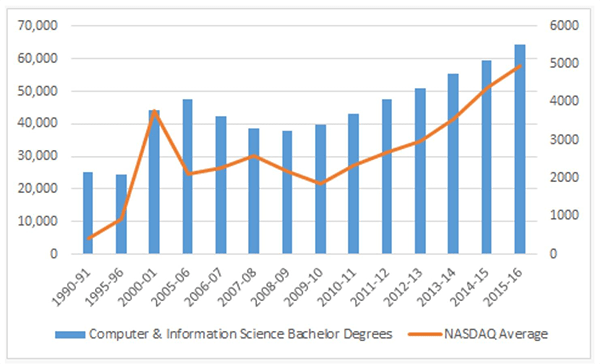Economics, Continuous Education & Digital Transformation in Education
- May 27, 2020
It’s a natural function of the economy to move through periods of booms and busts. When the economy falters, people commonly turn to education as a means to improve their skillsets. And, in the process, set themselves up for greater success when the economy recovers. As we enter into a period of economic uncertainty, continuous education again gains in importance, presenting two important opportunities: One for those seeking skills to accelerate their careers and another for educational institutions.
Interestingly, Stanford professor and associate chair for education in the computer science department, Mehran Sahami, has studied the parallels between the US economy and the number of bachelor degrees achieved in computer science. He’s found that the two are closely aligned, growing and declining in relative sync with one another. (Note that degrees achieved lag economic indicators due to the time required to declare and achieve a B.S.)

While business-minded students are selecting majors using the economy as a barometer, for many companies, the technology skills gap persists. In today’s marketplace businesses frequently flag cloud platforms, cloud security, and advanced cloud functions as areas where the skills shortage actively creates roadblocks to business progress.
Uniting Opportunities
Fortunately for all involved, these opportunities collide: People looking to upskill turn to educational institutions, and those institutions have the opportunity to help people gain new skills in an agile fashion. As education helps close the skills gap, they have the opportunity to become an ongoing partner to business as the half-life of skills continues to shrink.
New Business Models Drive Education Transformation
A typical business competency now lasts about five years, down from 30 years in 1984. Within technology where new innovation is continuously introduced, skills lose their value even faster. As a result, continuous education is becoming imperative to business — and career — success.
Educational institutions are deploying a variety of approaches to help both employers and employees remain abreast of the skills needed to remain competitive. Education is transforming with new business models. For example, traditional four-year universities are beginning to offer online courses for non-degree seeking students while for-profit educators are experimenting with bite-size credentials, remote proctoring, and continuous education through corporate partnerships.
Enabling New Business Models
These new models require new platforms and technologies for everything from student acquisition to content delivery and from employee engagement to corporate partner integration. To achieve the flexibility and agility needed for continuous teaching and learning, an agile platform that allows educational institutions to quickly deploy new and/or update existing tools is critical.
Specifically, to achieve a system that supports evolving business models, institutions should consider a sound, secure cloud platform that drives agility through service-agnostic infrastructure and components that can enable agility at scale using repeatable patterns. In addition, technology-enabled processes allow for the quick and easy deployment of new educational services and the update of existing solutions for students, staff, partners, and more.
Together a platform and processes should provide the ability for educational organizations to dynamically provide services that are both comprehensive and ‘bite-size’, meeting the need for everything from degree-seeking students to those pursuing skill-specific certificates. This is especially true as universities and other educational institutes quickly pivot to online learning platforms and virtual mechanisms for business continuity.
While data analytics has gained in popularity across industries, education is certainly no exception. Master data management and analytics practices will play a critical role in collecting data for everything from student recruitment, enrollment, and retention to cost-efficiencies across smart campuses, improving staffing outcomes, growing the success of development efforts, and more.
Taking a Queue from a Different Industry
Loyalty is the lifeblood of retail. While only 12-15% of customers remain loyal to just one retailer, they represent 55-70% of retail sales, according to the Customer Insight Group. Retailers identify that 12-15 % of shoppers through loyalty programs and data analytics. For example, we had the opportunity to work with a home furnishing retailer to help it migrate its loyalty management software from legacy IBM hardware to the cloud. The new cloud-based system replaces a highly manual process with automation that allows developers to focus on innovation as the retailer is able to organize its data in a data lake to gain deeper, actionable customer insights.
Within hospitality, the ability to acquire customers across channels is important to business success. With a strong cloud platform and processes for automation, HomeAway was able to launch a last-minute campaign, called Reroute Santa, to eight different markets and seven different languages around the world while scaling to meet traffic that peaked at different times. Designed for high availability, there was not a single failure over the entire duration of the campaign, allowing it to reach over 300 million unique global viewers.
Meeting varying needs, accelerated software releases can dynamically address instructor and student requirements. With agile systems supporting their business, educational institutions will be able to quickly experiment with new initiatives, changing course when necessary with the ability to roll out rapid updates to SaaS solutions.
Read how other organizations have faced uncertainty head-on with SaaS solutions and continuous delivery. Together they ensure the latest innovation is consistently in front of customers, enabling new digital business models.
- Flux7 Helps Implement G6 Hospitality IT 2.0 Program
- Vision Graphics Grows Business, ROI with AWS-Powered Digital Transformation
- Web Developer Grows Performance, Elasticity, and Security through AWS CloudFormation, ELB and WAF Expertise
- Major Wholesaler Grows Uptime by Refactoring eComm Apps for AWS DevOps
While the current market is full of economic uncertainty, educational institutions can accelerate their new business models with agile infrastructure. This provides a solid competitive advantage regardless of a forthcoming boom or bust.
Subscribe to our blog




